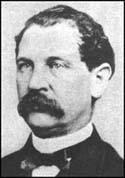Thomas Eckert

Thomas Eckert was born in Ohio in 1825. He worked with several telegraph companies before managing a gold mine in North Carolina. On the outbreak of the American Civil War he returned to Ohio where he joined the military telegraph service.
In 1862 Edwin M. Stanton, the new Secretary of War, appointed Eckert as chief of the War Department telegraph office. President Abraham Lincoln was a regular visitor to Eckert's office in order to read telegrams sent in by his generals from the front.
Lincoln grew to trust Eckert and on 14th April, 1865, and wanted him to act as his bodyguard when he visited the Ford Theatre to see Our American Cousinon 14th April, 1865. Edwin M. Stanton refused permission for Eckert to go claiming he had an important task for him to perform that night. In fact, this was not true and Eckert spent the evening at home.
Further suspicion fell on Eckert when the telegraph lines under hiss control were out of action on the night of the assassination. As a result of this problem no messages could be sent from Washington to alert the country about the escape of John Wilkes Booth.
After the war Eckert was promoted by Edwin M. Stanton to Assistant Secretary of War. In 1867, with the help of Stanton, Eckert found work with the Western Union. He became president in 1893 and chairman of the board in 1900.
Thomas Eckert died in 1910.
Primary Sources
(1) Otto Eisenchiml, Why Was Lincoln Murdered? (1937)
On 14th April, Lincoln asked Stanton to let him have his chief aide, Major Thomas T. Eckert, as escort for himself and his guests. "I have seen Eckert break five pokers, one after another, over his arm," Lincoln declared, "and I am thinking he would be the kind of man to go with me this evening. May I take him." This request Stanton refused point-blank; he had some important work for Eckert that night, he said, and could not spare him.
But Lincoln was not so easily rebuffed. He went into the cipher room, over which Eckert presided, and told the latter of his plans for the evening. He also repeated his request that this strong-armed assistant of Stanton's become one of the theatre party. So far as the work was concerned, the President suggested that it could be done the next day. Eckert also very decidedly refused to go, however, pleading work that could not be put off; and so Lincoln reluctantly left. "I shall take Major Rathbone along," he said in parting, but I should much rather have you."
(2) Major Thomas Eckert was interviewed by a Congress committee in April, 1867.
Q: Did you have knowledge of the telegraph lines at or about the time of the assassination of President Lincoln?
A. I did.
Q. Was there any interruption of the lines that night?
A. Yes, sir.
Q. What was it?
A. It was my impression they were cut, but we got circuit again very early the next morning.
(3) David Balsiger and Charles E. Sellier, The Lincoln Conspiracy (1977)
Someone who knew a lot about telegraphy had destroyed the capital's outgoing telegraph and prevented the public from knowing the facts about the assassination for several hours. Only someone familiar with telegraphy, working inside the main terminal area, could have so effectively sabotaged the news wire.
